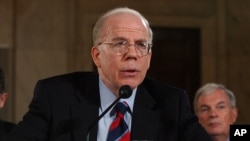United States lawmakers met Wednesday with President Donald Trump’s choice to lead the Central Intelligence Agency (CIA).
The Senate Intelligence Committee held a confirmation hearing on his nomination of Gina Haspel as CIA director. Haspel is a long-time operative for the agency and currently its second-in-command.
Committee members wanted to know about her part in carrying out the CIA's "enhanced interrogation" program. The agency has been criticized for its methods of questioning terror suspects who were captured after the September 11, 2001 attacks on the U.S. Critics have likened some of those interrogation techniques to torture.
Haspel told the committee that the CIA has learned “tough lessons” from its use of severe detention and interrogation. She also said that, as director, she would not let the agency restart such a program.
The committee hearing directed international attention on a woman who has made her career by operating in almost complete secret.
Just last week, Haspel offered to withdraw her nomination as the agency’s director. However, Trump administration officials talked to her for several hours, persuading her to stay on.
CIA career
The idea Haspel would walk away from something big is foreign to those who have worked with her during her more than 30 years at the CIA.
Former coworkers describe the 61-year-old deputy CIA director as strong, sure and honest. They say she is exactly the kind of leader who would build trust and loyalty from those still in the intelligence community.
But the idea that Haspel would place the well-being of the agency above her own political future resonates with those who have served with her.
Carol Rollie Flynn served 30 years at the agency, working in secret operations and at the CIA’s anti-terrorism center.
"I think she's a genuine public servant who's in this to do the right thing, do a good job and serve the country," Flynn told VOA.
Carmen Medina, another former coworker, is a former CIA deputy director of intelligence. She said of Haspel, "There was just not a lot of ego about her, at all."
Yet it is exactly those qualities that seem to make Haspel and the Trump administration an unusual partnership.
Her friends and former colleagues say Haspel is a skilled political operator. But they say she wants to present policy makers with a true, factual idea of what the intelligence shows. She does not color it with any favoritism for one set of policies or another.
CIA push for apolitical Haspel
And that difference may explain in part why the agency has done so much to push for Haspel's confirmation.
Former acting director John McLaughlin says "An agency professional is what these times require, these times of alternative facts and partisan politics at a high-level."
Medina noted an independence to Haspel’s thinking. "It might make her not as influential perhaps as someone like (Secretary of State Mike) Pompeo..."
Concerns about torture
Yet there are many for whom none of this is enough given what is known about Haspel’s past.
In 2002, she briefly was responsible for a secret CIA prison in Thailand. Its detainees were waterboarded for information, among other things.
Additionally, Haspel is accused of calling for the destruction of 92 videotapes of interrogations. Those tapes were destroyed in 2005, leading to a Justice Department investigation that ended without charges. The CIA has always said her actions were legal.
However, Albert Mora, a former top lawyer for the Navy, disagrees. "The act of torture is a criminal act," he said.
Robert Ford, the former U.S. ambassador to Syria, is even more critical.
"She made a conscious decision to take these jobs, and therefore a conscious decision to be associated with the programs."
Defending Haspel
Earlier this week, the Trump administration released a statement calling questions about the interrogation program "a false debate." It said responsibility lies with policymakers who approved the program and not those who carried it out.
However, for many, the level to which the CIA is already involved in this debate over Haspel’s nomination is worrisome.
"It is reasonable, as a matter of informing the Congress and the public about this nominee, to be putting out public information about her [Haspel]," noted Paul Pillar, another former CIA officer.
"To the extent that any of the releases ... go beyond the providing of useful information and seem to take the form of lobbying, then I think it is improper," he added.
I’m Mario Ritter .
And I'm Anna Matteo.
Caty Weaver wrote this story for VOA Learning English based on reports from VOANews.com and the Associated Press. George Grow was the editor.
We want to hear from you. Write to us in the Comments section, and visit our Facebook page.
_____________________________________________________________
Words in This Story
enhanced interrogation - n. a central intelligence program of detaining and questioning people using methods considered torture and illegal by many
tough - adj. physically and/or emotionally strong
lesson - n. something learned through experience
resonate - v. to affect or appeal to in a deep or emotional way
genuine - adj. sincere and honest
ego - n. the opinion that you have about yourself
waterboarding - v. an interrogation method in which water is forced into a detainee's mouth and nose so as to create the sensation of drowning.
conscious - adj. awake and able to understand what is happening around you
associate - n. to relate or connect in some way
lobby - v. to work to influence government decisions that relate to a particular industry, issue, etc.
improper - adj. not following rules of acceptable behavior: legally or morally wrong









